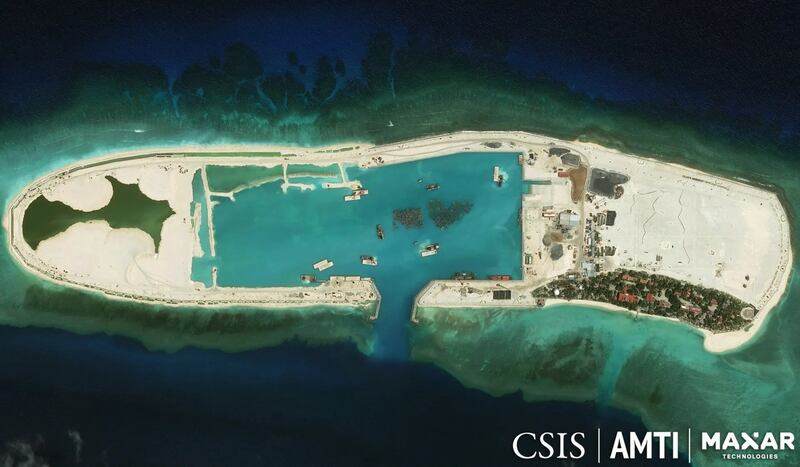The Philippine navy is “monitoring” Vietnam’s island building activities in the West Philippine Sea -- part of the South China Sea within Manila’s exclusive economic zone, a naval official said.
The spokesperson for the West Philippine Sea, Commodore Roy Vincent Trinidad, told a radio station that both the navy and the department of foreign affairs were watching the situation.
Manila claims jurisdiction over a group of reefs and rocks, called the Kalayaan island group in the Philippines. Most of the reefs are within the Spratly archipelago, which is contested by several countries in the region.
The Asia Maritime Transparency Initiative (AMTI) think tank said in a recent report that in six months Vietnam had created as much new land in the South China Sea as the previous two years combined.
Vietnam has reclaimed a total area of 955 hectares, about half the area that China has built up throughout the years, according to AMTI.

The Philippines’ measured response to the report of Vietnamese land reclamation in areas that it also claims comes after a period of intensifying confrontation between Manila and Beijing over other features in disputed waters.
The Philippines and Vietnam have “friendly relations,” Trinidad told the Super Radyo dzBB station. “Vietnam does not initiate illegal, coercive, aggressive, and deceptive actions against us, unlike China,” he added.
Earlier, another Philippine official said that Vietnam was reclaiming features that it occupied before a 2002 Declaration on the Conduct of Parties in the South China Sea.
“Vietnam focuses on minding their own affairs,” Philippine coast guard spokesperson Jay Tarriela told reporters.
“They do not engage in harassing our fishermen or illegally deploying coast guard vessels and maritime militia in the waters surrounding our occupied maritime features,” Tarriela added.
Divisive issue
The Philippines has in the past issued a formal diplomatic protest against Vietnam’s island building, which was the usual practice in response to any such foreign activity in the West Philippine Sea, said Jay Batongbacal, a maritime legal expert.
“It was more about the concern over the environmental impact of such activities as the Philippines gives great value to marine habitats and species diversity,” Batongbacal told RFA. “This has not affected Vietnam-Philippines relations overall.”
Botongbacal said the two countries had been engaged in constant dialogue as two claimants from the Association of Southeast Asian Nations, or ASEAN, in accordance with the 1992 ASEAN Declaration of Conduct for parties in the South China Sea and the 2002 Declaration of Conduct between the block and China.
Related Stories
[ Vietnam's South China Sea island building sets record in 2024: reportOpens in new window ]
[ Vietnam rapidly builds up South China Sea reefOpens in new window ]
[ Manila accuses Beijing of island building in South China SeaOpens in new window ]
Manila and Hanoi established a strategic partnership in 2015 and have been working together to manage their overlapping claims in the South China Sea amid new maritime challenges posed by their big neighbor China.
The Philippine Ambassador to Vietnam, Meynardo LB. Montealegre, on Wednesday called Vietnam "our twin brother in the ASEAN region," and that the two countries are "sharing the South China Sea as our common space for growth, our life-giving source for development and equally essential for our co-existence."
Yet Vietnam’s recent efforts could become a divisive issue between them.
A recent article by Rigoberto Tiglao in the Manila Times named Vietnam the Philippines' "other threat."
“As sure as the sun rises in the East, if China vacates its occupied artificial islands in the South China Sea, the Socialist Republic of Vietnam will be landing its troops on each and every island, and it has been preparing to do so for a decade,” he wrote.
The Manila Times, commonly seen as pro-China, previously published reports on Vietnam’s militarization of its outposts in the South China Sea, citing leaked documents from its defense ministry. There has been no independent verification of the documents and experts casted doubt on their authenticity.
However, after the articles were published, a group of Filipinos held a protest and tore down Vietnam’s flag in front of its embassy in Manila, prompting Vietnamese officials to ask Philippine authorities to “handle the incident seriously.”
Edited by Taejun Kang.
